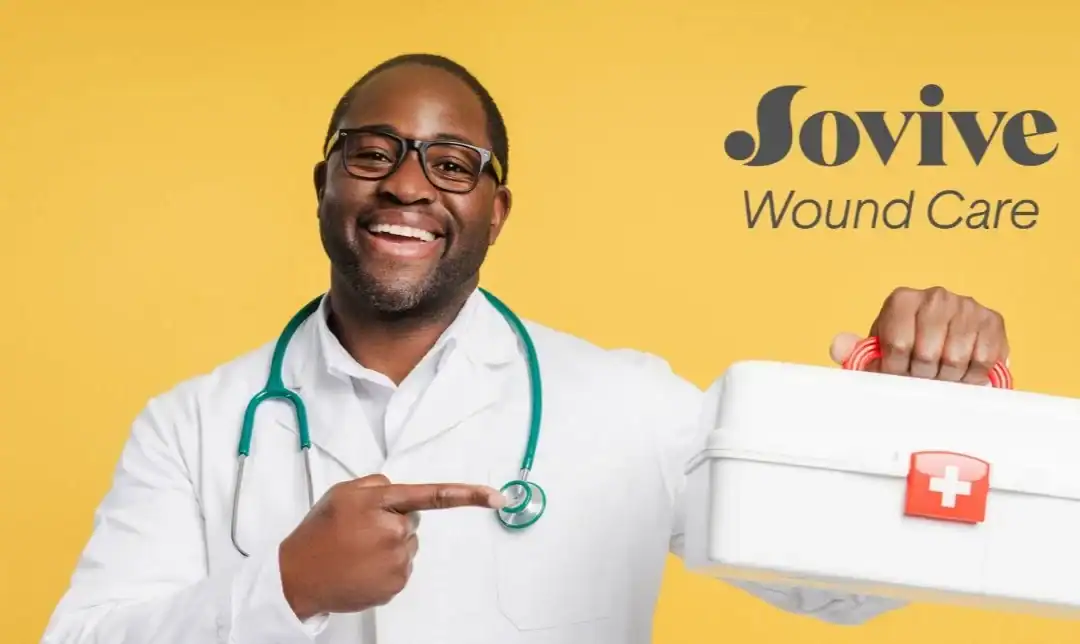Living with wounds that don’t heal can be difficult. But thanks to treatments like debridement, advanced dressings, compression therapy, and more, many people with stubborn wounds are finding hope—and healing.
Dr. David Kwon, a provider at Jovive Wound Care, explains the core of his work:
“Every wound tells a story, and our job is to use the right tools and treatments to change that story—to help patients heal and regain their lives.”
At Jovive Wound Care, we use a variety of advanced treatments to help wounds heal more quickly and reduce pain and complications. Here’s a simple look at some of the key treatments we offer and how they work:
Debridement: Cleaning the Wound for a Fresh Start
Sometimes wounds get stuck because dead or damaged tissue is in the way. Debridement is the process of carefully removing this tissue to give the body a fresh surface to heal. There are two main types:
- Physical debridement involves gently scraping or cutting away dead tissue.
- Enzymatic debridement uses special medicines that help dissolve unhealthy tissue without hurting healthy skin.
Removing dead tissue helps healthy cells grow and lowers the risk of infection.
Advanced Dressings: Protecting and Supporting Healing
Not all bandages are created equal. Advanced dressings are designed to keep the wound moist (which actually helps healing), protect it from germs, and encourage new skin to grow.
These dressings can absorb extra fluids, reduce pain, and speed up the recovery process.
Negative Pressure Wound Therapy: Using Gentle Suction to Boost Healing
For more serious wounds that produce a lot of fluid or don’t heal easily, negative pressure wound therapy (sometimes called wound vac) can help. This treatment uses a special device that creates gentle suction on the wound.
The suction removes extra fluids and helps bring blood to the area, which is important for healing. It also helps close the wound faster.
Compression Therapy: Improving Circulation to Heal Leg Wounds
Some wounds, especially on the legs, happen because of poor blood flow. Compression therapy uses special wraps or stockings to gently squeeze the leg, helping blood move better.
Better circulation means more oxygen and nutrients get to the wound, so it can heal.
Offloading: Taking Pressure Off the Wound
Pressure on a wound can stop it from healing. Offloading means using special shoes, braces, or padding to reduce pressure on the wound area—giving the skin a better chance to repair itself.
This is especially important for wounds on the feet, like diabetic foot ulcers.
Skin Substitutes: Giving Tough Wounds a Boost
Sometimes wounds get stuck even with the best care. In those cases, skin substitutes can help. These are special biological materials that act like a scaffold or foundation, helping the body grow new skin and tissue.
Dr. Kwon explains,
“We only use skin substitutes in about 5% of cases, usually when wounds aren’t healing after weeks of treatment. But for those patients, it can be a true game-changer.”
A Patient’s Journey: How These Treatments Come Together
One patient came to Jovive after two years of painful wounds on both legs. After trying many treatments elsewhere, she found little relief.
Dr. Kwon and the team used a mix of treatments: carefully cleaning the wounds, applying advanced dressings, using negative pressure therapy, and eventually adding skin substitutes.
Over the course of a year, her wounds shrank dramatically—from a very large size to almost healed. She was able to reduce pain and get back to daily life without fear of leakage or dressings showing.
“It’s not just healing a wound—it’s restoring a person’s quality of life,” Dr. Kwon says.
When Should You Consider Wound Care Specialists?
While treatments are key, knowing when to get expert help matters too. Dr. Kwon advises,
“If a wound isn’t getting better after about four weeks, it’s time to see a wound care specialist.”
Early treatment can prevent infections, hospital stays, and other serious problems.
If you or someone you know has a wound that won’t heal, advanced wound care treatments might offer new hope. The right treatment plan can make a big difference.
For more information or to find out if you qualify for specialized wound care, contact Jovive Wound Care today.
Want to learn more?
To learn more about the importance of advanced wound care and how specialized treatments are changing lives, Dr. Edward Cho, National Physician Director of Outpatient Medicine at Vituity, sat down with Dr. David Kwon, Provider at Jovive Wound Care. This interview is part of our ongoing series highlighting innovations in wound healing.
Check out the full conversation here: Wound Healing Awareness Month: How Innovative Treatments in the Right Hands Can Change Lives


